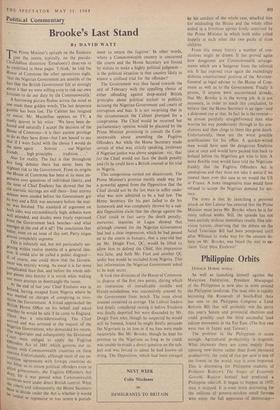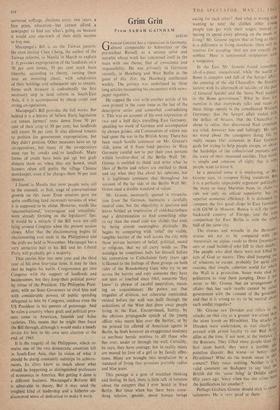Philippine Orbits
DONALD HORNE writes : As well as launching himself against the Malaysian Federation, President Macapagal of the Philippines is now also in orbit around the Philippine landlords. The man who is rapidly becoming the Roosevelt of South-East Asia has sent to the Philippine Congress a Land Reform Bill that will probably win his party this year's Senate and provincial elections and could possibly start the third successful land reform movement in the Far East. (The first two were run in Japan and. Taiwan.) The problem in the Philippines is acute enough. Agricultural productivity is stagnant. What increases there are come mainly from opening new farms rather than from increased productivity; the yield of rice per acre is one of the lowest in the world; rice is even imported. This is distressing for Philippine students of Professor Rostow's The Stages of Economic Growth. Rostow himself had predicted a Philippine take-off. It began to happen in 1957; then it stopped. It is even more distressing for the millions of poverty-stricken small farmers who enjoy the full apparatus of democracy- universal suffrage, elections every two years, a free press, education—but cannot afford a newspaper to find out what's going on because it would cost one-tenth of their daily income to buy one.
Macapagal's Bill is on the Taiwan pattern. He even invited Chen Cheng, the author of the Taiwan reforms, to Manila in March to explain it It provides expropriation of the landlords on a 70 per cent bonds, 30 per cent stock basis (thereby, according to theory, turning them into an investing class), with subdivision of their holdings and subsequent sale to tenants. Some such measure is undoubtedly the first necessary step in land reform in South-East Asia, if it is accompanied by cheap credit and strong co-operatives.
Macapagal's Bill provides the full works. But behind it is a history of failure. Early legislation cut tenant farmers' rents down from 50 per cent of their crop to 30 per cent; but landlords still extort 50 per cent. It also allowed tenants to petition for government expropriation; but they didn't petition. Other measures have set up co-operatives, but many of the co-operatives were run by crooks and/or landlords. Many forms of credit have been put up; but graft distorts them or, when they are honest, small farmers often still prefer the village Chinese storekeeper, even if he charges them 50 per cent interest.
I found in Manila that most people were still in the stunned, or first, stage of conversational growth on this issue. Even senators gave me quite conflicting (and incorrect) versions of what it is supposed to be about. However, words like `unconstitutional,' 'extravagant' and 'unrealistic' were already forming on the legislators' lips; it would be a miracle if the Bill were not still lying around Congress when the present session closes. After that the electioneering begins (if electioneering ever ends in the Philippines) and the polls arc held in November. Macapagal has a very attractive bait in his Bill and his Liberal Party will probably get a majority.
That carries him into next year and the third year of his own four-year term. It may be then that he begins his battle. Congressmen get into Congress with the support of landlords and businessmen, but they keep their political power by virtue of the President. The Philippine Presi- dent, with no State Governors to rival him and with considerable powers of public spending delegated to him by Congress, outdoes even the US President in his powers of patronage. And he rules a country where graft and political pres- sure come in American, Spanish and Asian varieties. This means that he might then force the Bill through, although it would make a handy device for him in his own next election at the end of 1965.
It is the tragedy of the Philippines, which re- mains one of the two democratic countries left in South-East Asia, that its vision of what it should be doing constantly outstrips its achieve- ments. Its elites know as much about what should be happening as distinguished professors of economics in America. But getting it done is a different business. Macapagal's Reform Bill is admirable in theory. But it may need the toughest kind of leadership and a hitherto un- discovered sense of dedication to make it work.



































 Previous page
Previous page